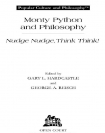Monty Python and Philosophy, Gary Hardcastle [portable ebook reader TXT] 📗

- Author: Gary Hardcastle
Book online «Monty Python and Philosophy, Gary Hardcastle [portable ebook reader TXT] 📗». Author Gary Hardcastle
In Hindu philosophy the transcendental being is called Brahman. Brahman is the permanent eternal reality that serves as the stable principle underlying the fluctuating world of material nature. The cosmos is always changing and becoming something new and different, but Brahman is the divine unity behind this veil of changing appearances. And in the same way that the cosmos has a persistent unchanging reality that is hidden from view, so too each human has a persistent unchanging reality hidden within. In the West we call the hidden reality within us the “soul” and in the East it is called “atman.” This view of humans as a combination of body and soul is frequently called “dualism.” My body may change its material composition from one year to the next (even one day to the next), but a soul or atman remains the same over the course of these changes and provides my source of personal identity (my self) over time. Hindu philosophers (especially in the Svetesvatara and Katha Upanishads) recognize the common metaphysical functions of these permanent realities, Brahman and atman, by claiming that they are actually one and the same substance or being. In other word, the permanent hidden soul or atman inside me is actually a piece of God or Brahman itself. A bit of Brahman is living inside me as my divine soul and through moral perfection and wisdom I can release this soul (my true self) after death to rejoin its transcendent origin. According to Hindu orthodoxy, my own moral weakness and persistent stupidity prevents the estranged bit of Brahman within me from reaching its “home,” and damns my soul to return again and again in subsequent lifetimes (reincarnation). Hindu scriptures liken the eventual metaphysical reunion (after countless lifetimes) to a drop of water returning to the ocean or a tiny spark returning to the eternal conflagration. And this final communion will be eternal bliss.
The belief in a soul, whether in its Eastern or Western version, is transcendentalist because it posits another reality beyond this mundane world of sensory experience. It suggests that my true self is some intangible undetectable being, having a similar metaphysical tint as God, that will eventually go to live in a world beyond.
In Monty Python’s The Meaning of Life the poor Yorkshire father (Palin) who explains to his abundant brood that “every sperm is sacred” is also a transcendentalist. The father is forced to sell his fifty-some children to science for “medical experiments” because God, according to Roman Catholicism, commands that sexual intercourse be for the exclusive purpose of procreation. As a result, there are just too many mouths to feed. Explaining the reason for the family’s predicament, the Yorkshire father says of the Church “Oh they’ve done some wonderful things in their time, they preserved the might and majesty, even the mystery of the Church of Rome, the sanctity of the sacrament and the indivisible oneness of the Trinity. But if they’d let me wear one of those little rubber things on the end of my cock we wouldn’t be in the mess we are now.”
This is no mere critique of organized religion and its inflexible dogmatic positions. A deeper critique is lurking here, too. No one, whether Catholic, Hindu, or Muslim, or whatever, would submit themselves to the decrees and directives of organized religion if they did not already accept a transcendental commitment and further accept that an earthly institution is the trustworthy authority on or manifestation of those eternal transcendental truths. This is clear when the father concedes to his dejected children that the Church may not see his transgression of the rules (a transgression lobbied for by the jeopardized children), but God will see everything. There’s no escaping transcendental justice.
The father of this family (and the transcendental moralist, generally) is so focused on upholding the abstract intangible rule of God, that he causes immeasurable misery and suffering in this world—the world that contains his own flesh and blood, his children. The transcendental divine world beyond this mortal coil is so compelling that it takes priority over or overrides this world and its attendant values.
A similar example of this transcendental override can be seen in the classic Hindu epic the Bhagavad Gita. The Gita tells the story of a military leader named Arjuna who finds himself leading an army against an opposing legion of his kinsmen. On the battlefield, just before combat, Arjuna confides to his chariot driver (the divine being Krishna in disguise) that he is morally conflicted about the impending battle. Why should he kill his cousins? Indeed, why should he kill at all? These deep apprehensions plague Arjuna’s mind in the beginning of the text, and the remainder of the scripture is a series of arguments and revelations that Krishna offers to inspire Arjuna into battle. First, Krishna explains, Arjuna should kill his enemies because God says so—on the grounds of simple, straightforward, divine authority. Like Abraham in the West, Arjuna must demonstrate his devotion to the sacred, transcendental powers.
The second explanation that Krishna offers involves the realities of the Hindu caste, or class, system. Arjuna was born into the ksatriya class, which means that it is his sacred duty to fulfill the actions of a warrior. Social caste was understood





Comments (0)